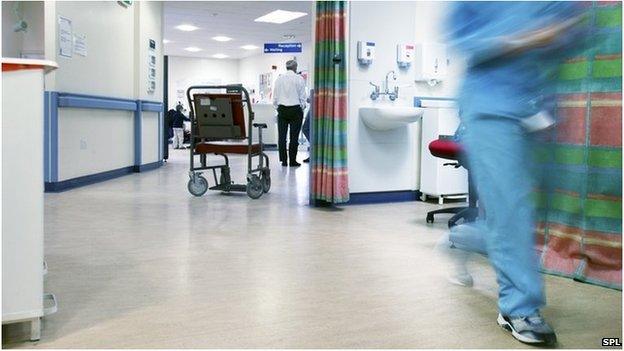More NHS patients miss 18-week waiting time target
- Published

The number of hospital patients being treated within 18 weeks of being referred by their GP has fallen below 90 per cent for the first time
Fewer patients are being treated by the NHS within the Scottish government's target of 18 weeks after they've been referred by their GP.
For the first time since the system was introduced, the proportion has fallen below 90 per cent.
The worst-performing health board is Forth Valley, with only 80.8 per cent of patients starting their treatment within the target period.
Across Scotland as a whole, the figure for March is 89.6 per cent.
That compares to 90.8 per cent in December 2013.
As well as Forth Valley, the other NHS boards which did not meet the target were Grampian, Lothian and Western Isles.
NHS Highland - which recently switched to a new patient management system - submitted an estimated number which will be revised when the next figures are released.
The Scottish Government said the three mainland boards were already investing to improve waiting-time performance while NHS Western Isles expects to deliver the 18-week standard by the end of the next quarter.
NHS Scotland insist more than £22m is being spent to to deliver sustainable improvements in the time it takes to see a patient.
Action plans
Health Secretary Alex Neil said: "Waiting times in our NHS have improved dramatically since 2007, when targets meant some people had to wait six months for a first appointment.
"But we must continue to cut waits and target areas where performance does not reach the standards we expect.
"That is why it is extremely encouraging that boards are able to invest in speeding up treatment times thanks to our decision to protect NHS funding.
"Already we have seen more than £22m of investment to increase capacity and I have no doubt that will increase over the year as plans are developed."
He added: "Overall, 11 of 15 boards have achieved the 18-week target while most boards continue to perform strongly against the 12-week legal treatment time guarantee.
"But we are seeing problems in certain boards which then affect the overall figures.
"Each of these boards already have clear action plans in place to ensure that they are working to address the reasons behind their poor performance so that they can treat patients faster."
Scottish Labour's Neil Findlay warned the figures should "raise alarm bells across our health service".
He said: "Large health boards are not meeting the target and it shows the NHS is simply not able to meet the capacity demands which it faces.
"We have also seen significant numbers of patients not being treated within 12 weeks under the treatment time guarantee.
Under pressure
"When these figures are put together with the struggling A&E waiting times, we see a health service which is struggling to cope and a Cabinet Secretary for Health who is more interested in abusing his office for his own political gain, than overseeing a properly-run, managed and funded health service across Scotland."
Mr Findlay said the figures showed the NHS was "breaking under pressure" and should be reason enough for Mr Neil to stand down.
He added: "Unfortunately for both patients and staff, Alex Neil will never accept responsibility for what is happening under his watch."
Meanwhile, the number of patients still in hospital six weeks after being judged ready to be discharged has risen dramatically over the past year.
There were 107 cases of so-called bed blocking in Scottish hospitals in April compared with 24 a year ago.
But the official figures, just published, showed the situation has improved over the past three months.
- Published8 May 2014
- Published28 April 2014
